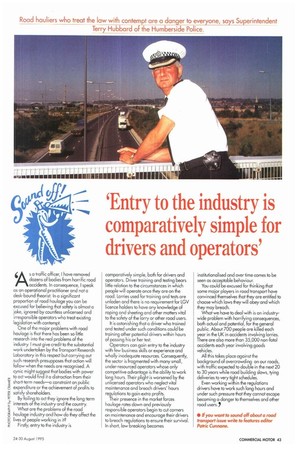'Entry to the industry is comparatively simple for drivers and operators'
Page 45

If you've noticed an error in this article please click here to report it so we can fix it.
6 s a traffic officer, I have removed
accidents. In consequence, I speak as an operational practitioner and not a desk-bound theorist. In a significant proportion of road haulage you can be excused for believing that safety is almost a joke, ignored by countless unlicensed and irresponsible operators who treat existing legislation with contempt. One of the major problems with road haulage is that there has been so little research into the real problems of the industry. I must give credit to the substantial work undertaken by the Transport Research Laboratory in this respect but carrying out such research presupposes that action will follow when the needs are recognised. A cynic might suggest that bodies with power
t• o act would find it a distraction from their l' short-term needs—a constraint on public c., expenditure or the achievement of profits to al satisfy shareholders.
.By failing to act they ignore the long-term
▪ interests of the industry and the country. i What are the problems of the road 6 haulage industry and how do they affect the (;) lives of people working in it?
I Firstly, entry to the industry is comparatively simple, both for drivers and operators. Driver training and testing bears little relation to the circumstances in which people will operate once they are on the road. Lorries used for training and tests are unladen and there is no requirement for LGV licence holders to have any knowledge of roping and sheeting and other matters vital to the safety of the lorry or other road users. It is astonishing that a driver who trained and tested under such conditions could be training other potential drivers within hours of passing his or her test.
Operators can gain entry to the industry with few business skills or experience and wholly inadequate resources. Consequently, the sector is fragmented with many small, under-resourcecl operators whose only competitive advantage is the ability to work long hours. Their plight is worsened by the unlicensed operators who neglect vital maintenance and breach drivers' hours regulations to gain extra profits. Their presence in the market forces haulage rates down and previously responsible operators begin to cut corners on maintenance and encourage their drivers to breach regulations to ensure their survival. In short, law breaking becomes institutionalised and over time comes to be seen as acceptable behaviour. You could be excused for thinking that some major players in road transport have convinced themselves that they are entitled to choose which laws they will obey and which they may breach. What we have to deal with is an industrywide problem with horrifying consequences, both actual and potential, for the general public. About 700 people are killed each year in the UK in accidents involving lorries. There are also more than 35,000 non-fatal accidents each year involving goods vehicles.
All this takes place against the background of overcrowding on our roads, with traffic expected to double in the next 20 to 30 years while road building slows, tying deliveries to very tight schedules. Even working within the regulations drivers have to work such long hours and under such pressure that they cannot escape becoming a danger to themselves and other road users.,




























































































































